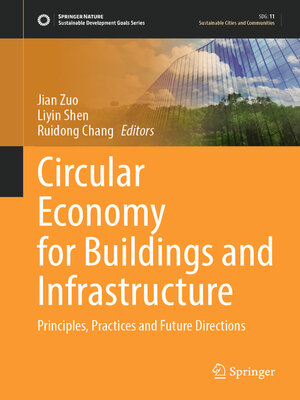Circular Economy for Buildings and Infrastructure
ebook ∣ Principles, Practices and Future Directions · Sustainable Development Goals Series
By Jian Zuo

Sign up to save your library
With an OverDrive account, you can save your favorite libraries for at-a-glance information about availability. Find out more about OverDrive accounts.
Find this title in Libby, the library reading app by OverDrive.



Search for a digital library with this title
Title found at these libraries:
| Library Name | Distance |
|---|---|
| Loading... |
This edited volume covers theoretical and practical aspects of circular economy in building development, offering chapters dealing with topics such as material design, affordability of housing development, waste management and recycling, smart metering, and more. A particular focus is placed on various stakeholders' points of view. The book's chapters are co-developed and contributed by multidisciplinary teams including both academics and industry practitioners. The case study-oriented approach taken here helps to facilitate the reader's understanding of how building sustainability can be achieved in the context of circular economy.
The building industry has significant environmental, social and economic impacts. As one of the biggest energy consumers and carbon emitters, building sustainability has attracted wide attention globally. Building projects and their associated activities consume a large amount of energy, natural resources and water while producing a large proportion of wastes throughout their lifecycles. The traditional linear approach of "make, use and dispose" has been heavily criticized, whilst the circular approach has gained momentum. Indeed, circular economy has emerged as one of key principles to manage sustainability related issues by means of focusing on the circularity of resources as well as the cost implications.
The building industry has significant environmental, social and economic impacts. As one of the biggest energy consumers and carbon emitters, building sustainability has attracted wide attention globally. Building projects and their associated activities consume a large amount of energy, natural resources and water while producing a large proportion of wastes throughout their lifecycles. The traditional linear approach of "make, use and dispose" has been heavily criticized, whilst the circular approach has gained momentum. Indeed, circular economy has emerged as one of key principles to manage sustainability related issues by means of focusing on the circularity of resources as well as the cost implications.







